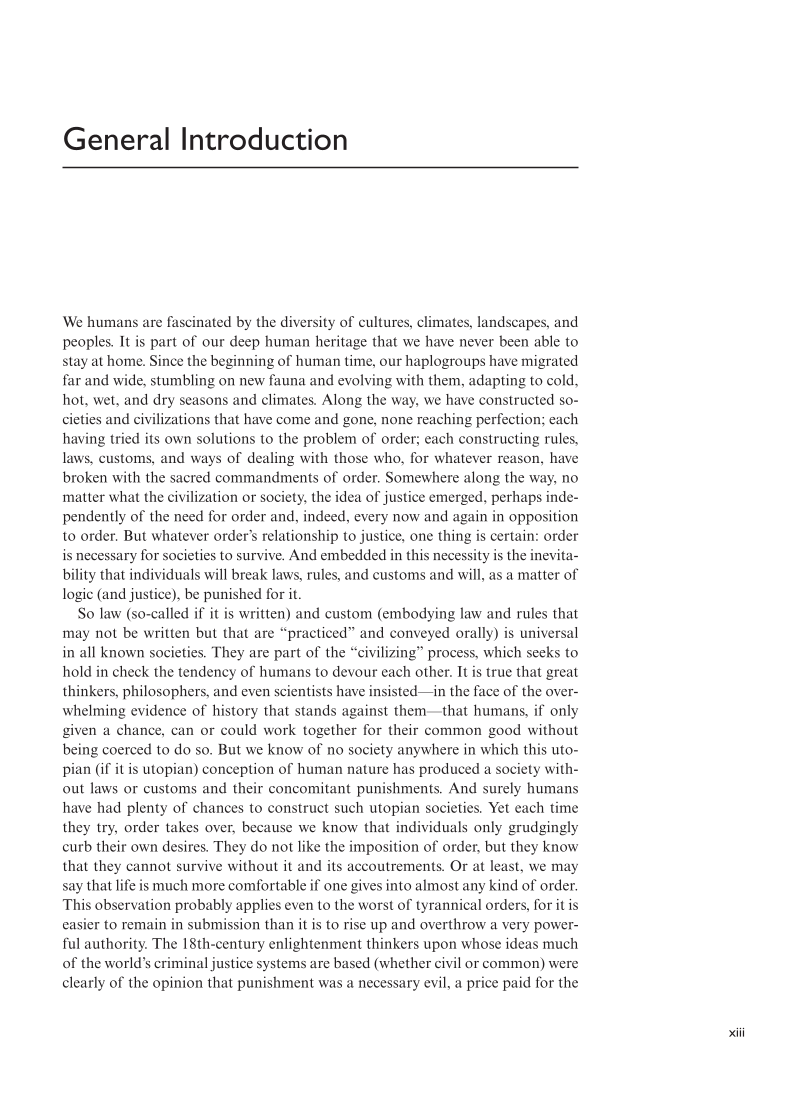xiii General Introduction We humans are fascinated by the diversity of cultures, climates, landscapes, and peoples. It is part of our deep human heritage that we have never been able to stay at home. Since the beginning of human time, our haplogroups have migrated far and wide, stumbling on new fauna and evolving with them, adapting to cold, hot, wet, and dry seasons and climates. Along the way, we have constructed so- cieties and civilizations that have come and gone, none reaching perfection each having tried its own solutions to the problem of order each constructing rules, laws, customs, and ways of dealing with those who, for whatever reason, have broken with the sacred commandments of order. Somewhere along the way, no matter what the civilization or society, the idea of justice emerged, perhaps inde- pendently of the need for order and, indeed, every now and again in opposition to order. But whatever order’s relationship to justice, one thing is certain: order is necessary for societies to survive. And embedded in this necessity is the inevita- bility that individuals will break laws, rules, and customs and will, as a matter of logic (and justice), be punished for it. So law (so-called if it is written) and custom (embodying law and rules that may not be written but that are “practiced” and conveyed orally) is universal in all known societies. They are part of the “civilizing” process, which seeks to hold in check the tendency of humans to devour each other. It is true that great thinkers, philosophers, and even scientists have insisted—in the face of the over- whelming evidence of history that stands against them—that humans, if only given a chance, can or could work together for their common good without being coerced to do so. But we know of no society anywhere in which this uto- pian (if it is utopian) conception of human nature has produced a society with- out laws or customs and their concomitant punishments. And surely humans have had plenty of chances to construct such utopian societies. Yet each time they try, order takes over, because we know that individuals only grudgingly curb their own desires. They do not like the imposition of order, but they know that they cannot survive without it and its accoutrements. Or at least, we may say that life is much more comfortable if one gives into almost any kind of order. This observation probably applies even to the worst of tyrannical orders, for it is easier to remain in submission than it is to rise up and overthrow a very power- ful authority. The 18th-century enlightenment thinkers upon whose ideas much of the world’s criminal justice systems are based (whether civil or common) were clearly of the opinion that punishment was a necessary evil, a price paid for the
Document Details My Account Print multiple pages
Print
You have printed 0 times in the last 24 hours.
Your print count will reset on at .
You may print 0 more time(s) before then.
You may print a maximum of 0 pages at a time.












































































































































































































































































































































































































































































































































































































































































































































































































































































































































































































































































































































































































































































































































































































































































































































































































































































































































































































































